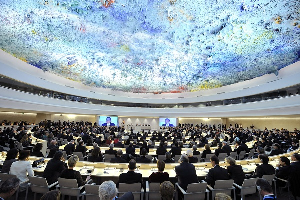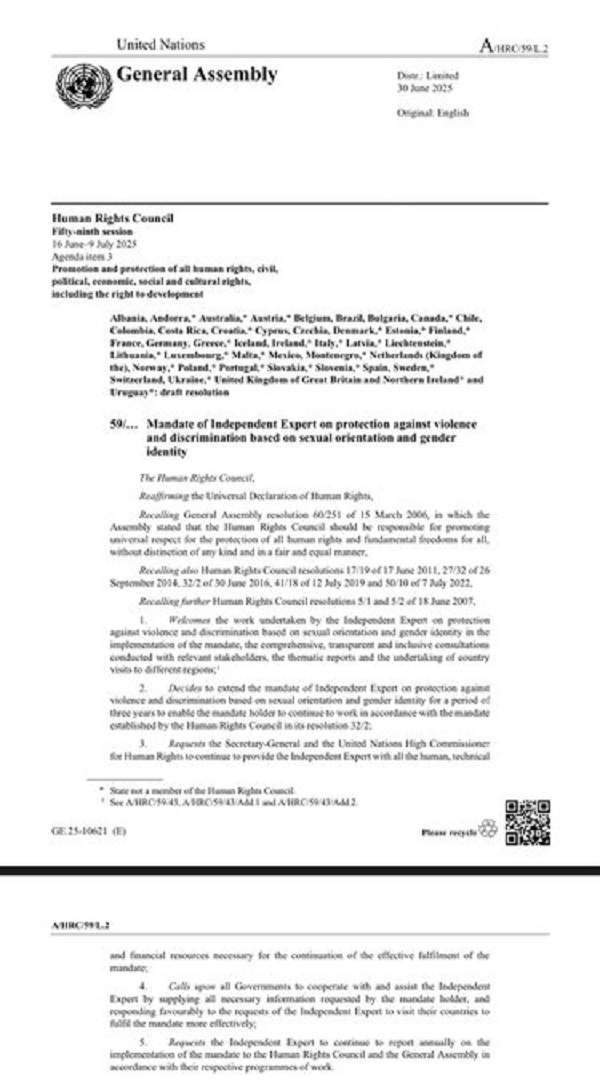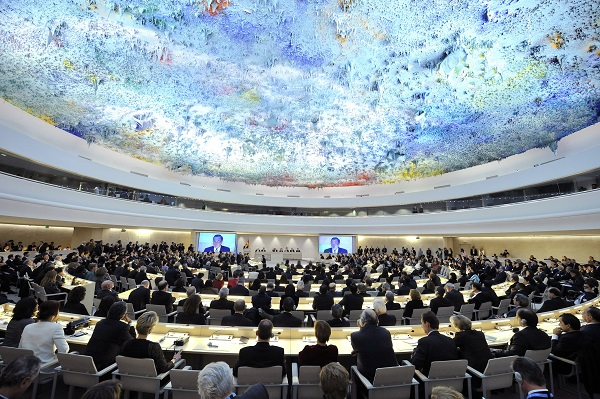 File photo of a sitting of the UN Human Rights Coucil
File photo of a sitting of the UN Human Rights Coucil
The John Dramani Mahama government has come under intense scrutiny following reports of Ghana’s representatives at the Human Rights Council of the United Nations (UN) absenting themselves from a vote on an issue that had to do with ‘gay rights’.
The Minister of Communication, Digital Technology and Innovation, Samuel Nartey George, has even criticised the decision of the representatives to abstain from voting on the matter.
Details of the matter, which was numbered A/HRC/59/L.5 and shared on ohchr.org, showed that Ghana was among three countries that abstained from voting on the said resolution, which was on the “Mandate of Independent Expert on protection against violence and discrimination based on sexual orientation and gender identity.”
Twenty-nine (29) members of the council voted in favour of the resolution, which led to its adoption, while only 15 voted against it.
The adoption of the resolution implies that the experts who provide the UN with reports on violence and discrimination against people because of their sexual orientation will continue their work.
“In a resolution (A/HRC/59/L.2) on the Mandate of Independent Expert on protection against violence and discrimination based on sexual orientation and gender identity, adopted by a vote of 29 in favour, 15 against and 3 abstentions, the Council decides to extend the mandate of the Independent Expert on protection against violence and discrimination based on sexual orientation and gender identity for a period of three years to enable the mandate holder to continue to work in accordance with the mandate established by the Human Rights Council; and requests the Independent Expert to continue to report annually on the implementation of the mandate to the Human Rights Council and the General Assembly in accordance with their respective programmes of work,” the brief on the resolution reads.
More details on the vote shared on ilga.org showed that Ghana, Benin and Kyrgyzstan were the three countries that abstained from voting on the resolution.
The countries that voted against the resolution included Algeria, Bangladesh, Burundi, China, Indonesia, The Gambia, Ethiopia, and the Democratic Republic of the Congo.
Those that voted in favour of the resolution included Albania, Belgium, Bolivia, Germany, France, Iceland, Japan and Colombia.

About the resolution:
According to ilga.org, the resolution was created in 2016, and renewed in 2019 and 2022.
The current resolution to renew the mandate was presented by a Core Group of six Latin American countries – Brazil, Chile, Colombia, Costa Rica, Mexico, and Uruguay – and was co-sponsored by 50 countries from all regions.
The Independent Expert is tasked with assessing the implementation of international human rights law, investigating violence and discrimination against LGBT and gender-diverse persons, and helping States, UN agencies, other mandates and bodies in the international and regional systems to address them.
Since the post was established, three successive mandate holders have conducted official visits to 11 countries, produced 17 reports documenting discrimination on the grounds of sexual orientation and gender identity – including the impact of the criminalisation of same-sex relations between consenting adults, the need to legally recognise a person’s gender, and the situation of LGBT persons who are forcibly displaced, among others – and sent communications documenting allegations of human rights violations to 171 States across all regions.

BAI/AE
You can also watch the latest news in Twi on GhanaWeb TV below:
Cheque Fraud EXPOSED: How it works and how to stay safe


